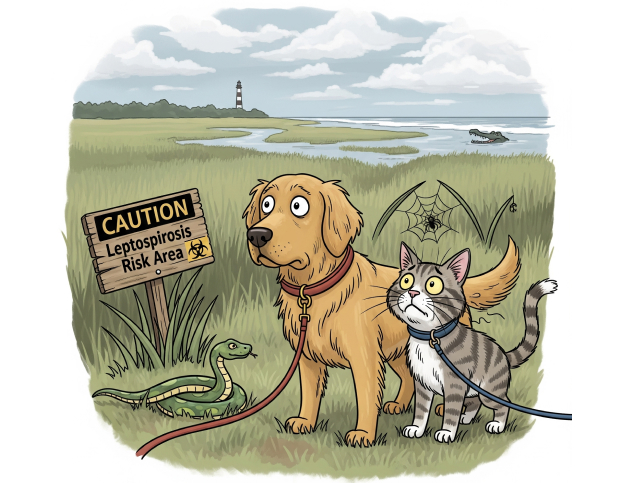Coastal Georgia is an ideal spot for outdoor adventures with your pets, but its beautiful landscape holds hidden dangers. From camouflaged predators to common plants, risks are everywhere. This guide covers the top environmental hazards in the Savannah and Coastal Lowcountry region, giving you the knowledge to identify, prevent, and respond to these threats.
1. The Threat From Within: Common Toxic Plants
Coastal Georgia’s vibrant flora, though beautiful, includes species that are toxic to pets. The danger is that many of these are common in landscaping, making them easily accessible.
Sago Palm: This popular landscaping plant is extremely toxic, particularly its seeds. Even a small amount can cause severe liver failure, and even death in dogs.
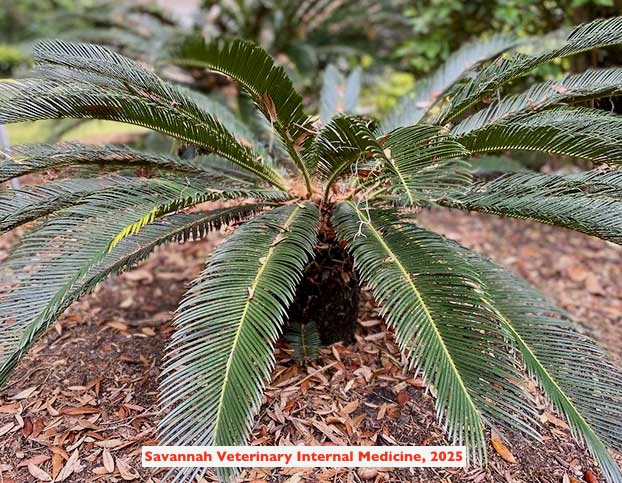
Amanita Mushrooms: The most notorious include the Death Cap (Amanita phalloides) and the Fly Agaric (Amanita muscaria), which can be found on lawns across Savannah. The toxins in these mushrooms can cause life-threatening damage to the liver and kidneys.
Oleander: A common ornamental shrub, oleander is highly toxic to dogs, cats, and horses. It contains cardiac glycosides that can be fatal.
Lilies: True lilies (Easter, Asiatic, Daylilies, and Tiger lilies) are a cat’s worst nightmare. Every part of the plant is highly poisonous to cats, causing acute kidney failure. Although not native to Savannah, these plants may be planted in gardens.
Other Plants: Other common toxic plants include Autumn Crocus, Castor Bean, Dieffenbachia, Foxglove, and the bulbs of Hyacinths and Daffodils.
What to do: If you suspect your pet has eaten any part of a toxic plant, contact your veterinarian immediately. Rapid treatment is critical.
2. The Unseen Threat: Household and Garden Chemicals
Dangers aren’t just in the wild; they’re often lurking in your home and garden.
Rat Poison: These are incredibly dangerous and can cause internal bleeding, severe kidney failure, or neurologic symptoms depending on the specific rat bait.
Antifreeze: Its sweet taste makes it attractive to pets, but even a small amount of ethylene glycol can cause acute kidney injury and even death.
Cocoa Bean Mulch: This mulch smells like chocolate and contains theobromine and caffeine, the same toxins found in chocolate. Avoid using it in pet-accessible areas.
What to do: Adopt a “pet-proofing” approach that covers every corner of your home and yard. All items must be securely stored in locked cabinets or inaccessible areas. Only use pet-friendly items in your landscaping and encourage your neighbors and HOA to do the same.
3. Alligators: Stealthy Predators
American alligators are native to coastal Georgia’s waterways and marshes. They are generally reclusive but can be unpredictable, especially if they lose their natural fear of humans. This is most often caused by humans feeding them.
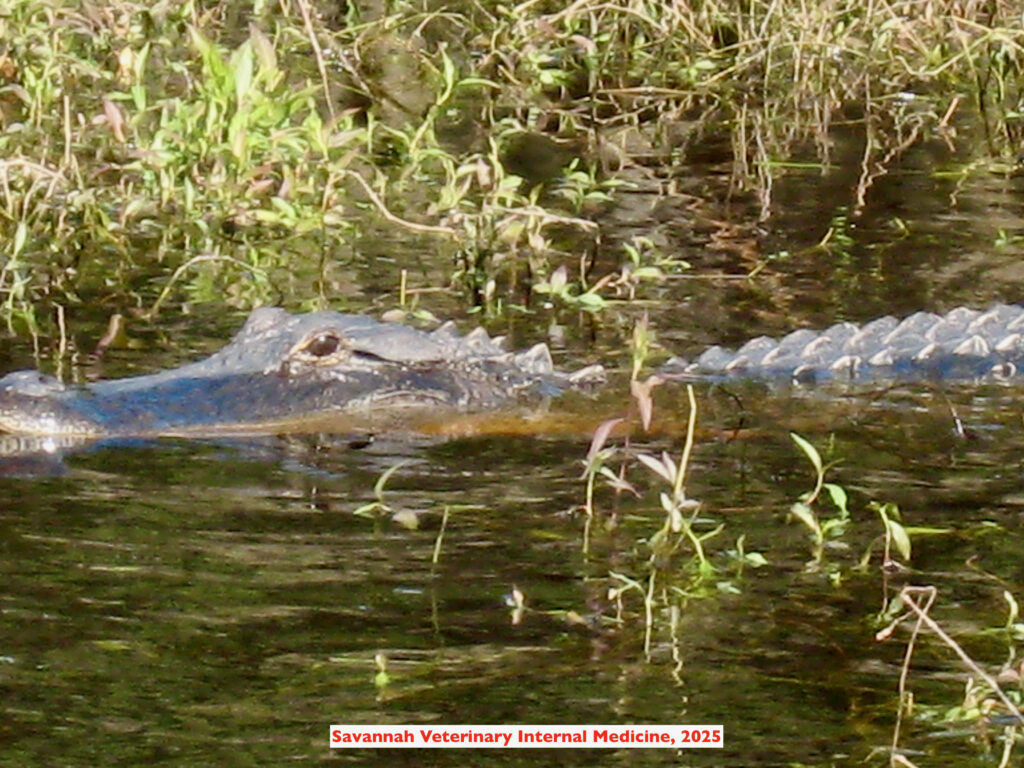
Be Safe, Don’t Be Next: From 1980-July 2023, there were nine reported cases of alligator attacks on humans in Georgia, including one fatality in 2007, according to the Georgia Department of Natural Resources.
What to do:
Never Feed Alligators: This is the most crucial rule. It is illegal in Georgia and causes them to lose their fear of humans, leading to bolder, more aggressive behavior.
Keep Pets Leashed and Away from Water: Always keep pets on a leash and away from the banks of lakes and ponds (even man-made ones!) especially at dawn or dusk when alligators are most active.
Maintain Distance: Stay at least 30 feet away from any alligator.
4. Venomous Snakes: A Ground-Level Threat
Coastal Georgia is home to numerous venomous snakes, including the Copperhead, Cottonmouth, and various Rattlesnakes. A snakebite is always a veterinary emergency.
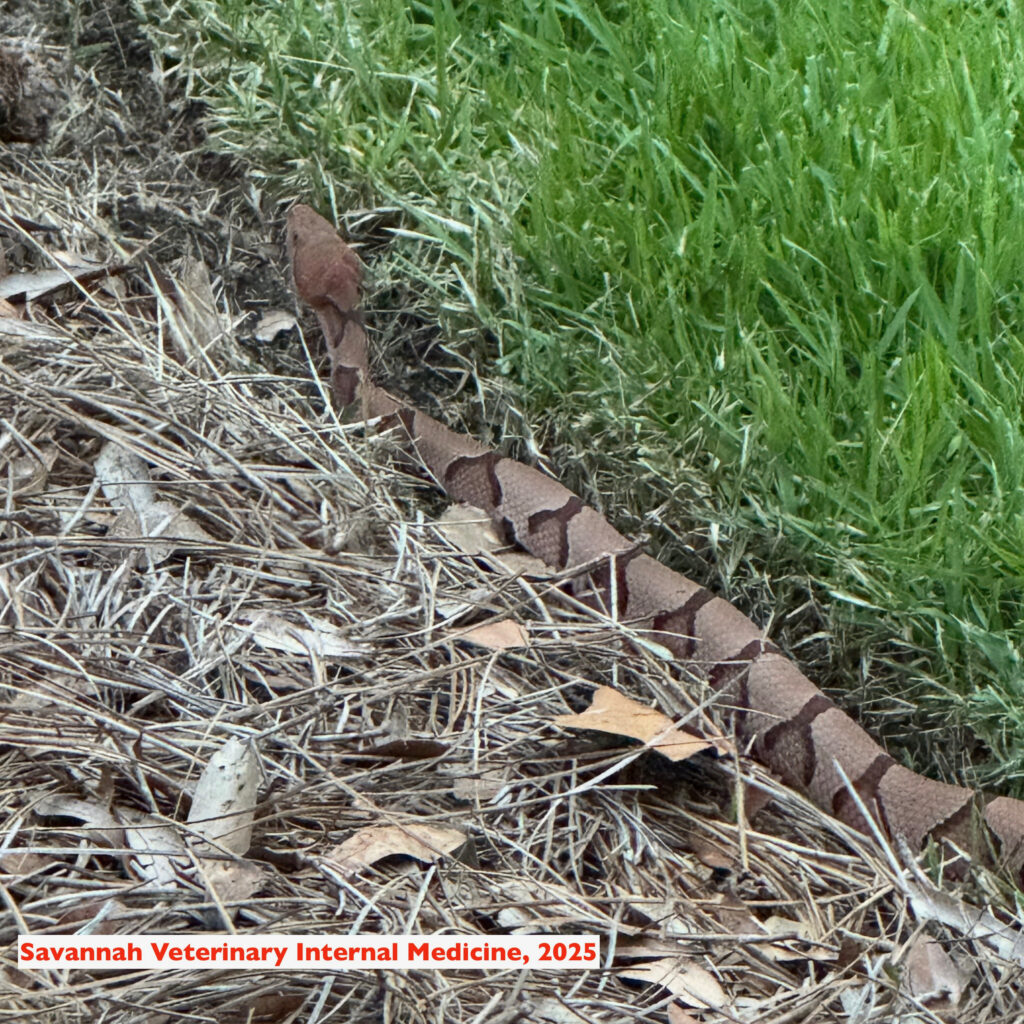
What to do:
Be Aware of Your Surroundings: When outside with your dogs, be vigilant about the terrain and possible natural inhabitants that may be present.
Immediate Veterinary Emergency: Always treat a snake bite as an emergency. Common signs are swelling and bleeding, typically on the nose or limbs.
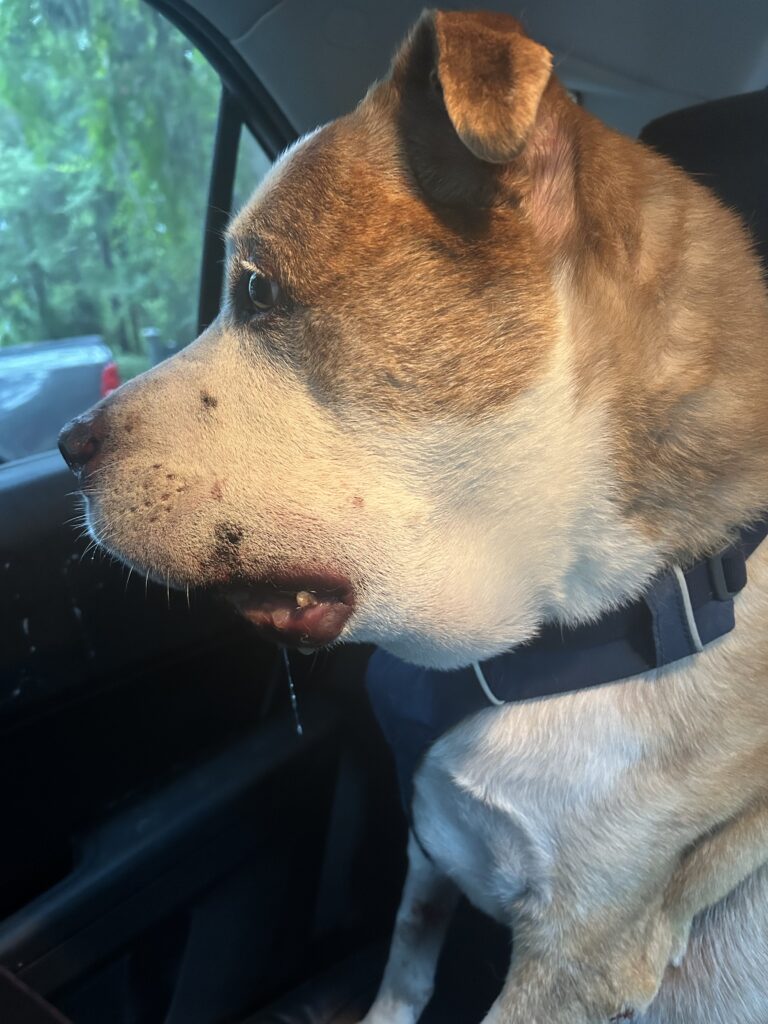
Stay Calm: Keep your dog still and quiet and get to the vet immediately. Do not apply a tourniquet, cut the wound, or attempt to suck out the venom. These are not helpful, and can make things worse.
Modify Your Environment: Eliminate rock piles and keep lawns low to reduce snake hiding spots.
Training: Snake avoidance training helps dogs learn to identify, react to, and avoid snakes. Search the web for professional training near you.
5. Coastal Water & Beach Hazards: It’s Not Always a Picnic
Coastal Georgia’s beautiful beaches and waterways invite fun, but they also hide specific dangers that require constant vigilance.
Saltwater Poisoning (Hypernatremia): Ingesting large amounts of saltwater can lead to severe dehydration, electrolyte imbalances, and dangerously high sodium levels. Symptoms include excessive thirst, vomiting, diarrhea, and seizures.
Marine Debris & Sharp Objects: Beaches can have plastic, fishing line, fishhooks, hypodermic needles, and other debris that can cause entanglement or severe digestive problems if ingested. Broken shells can also cut paw pads.
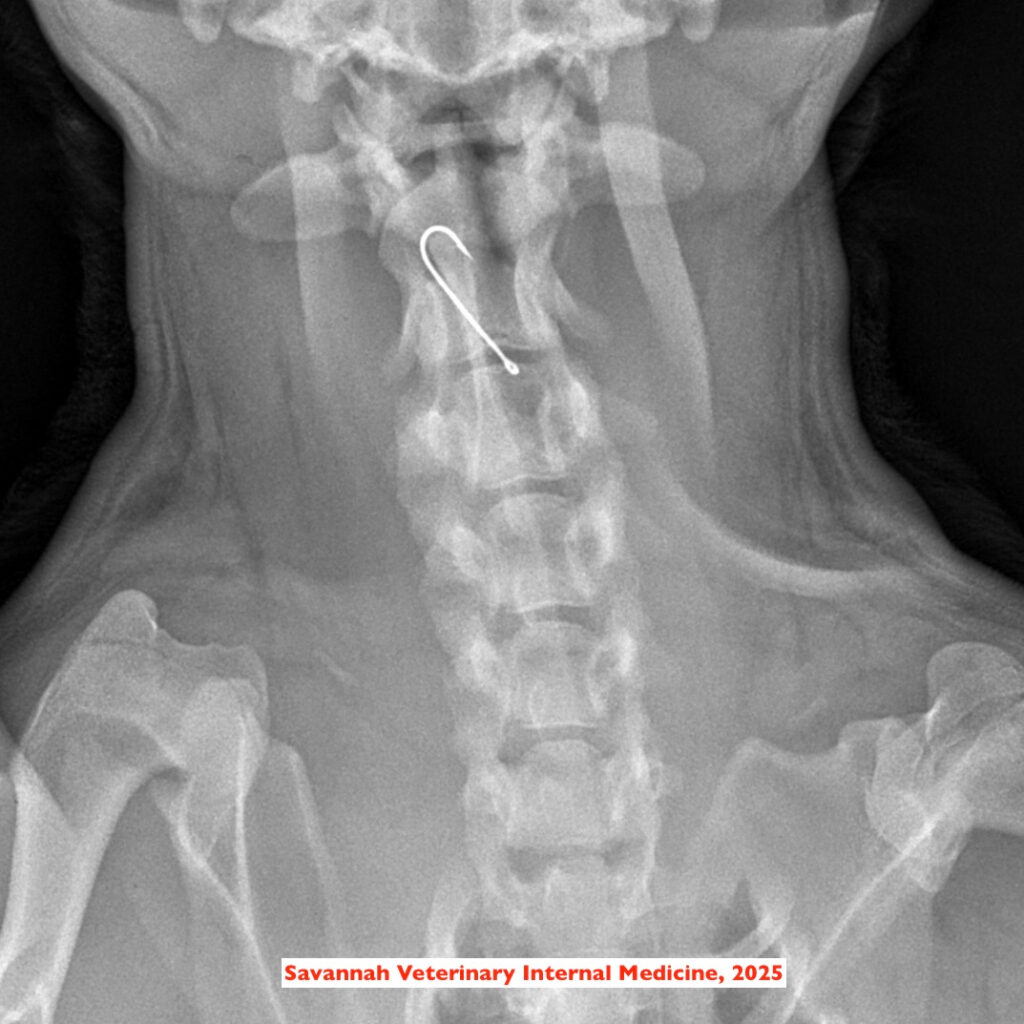
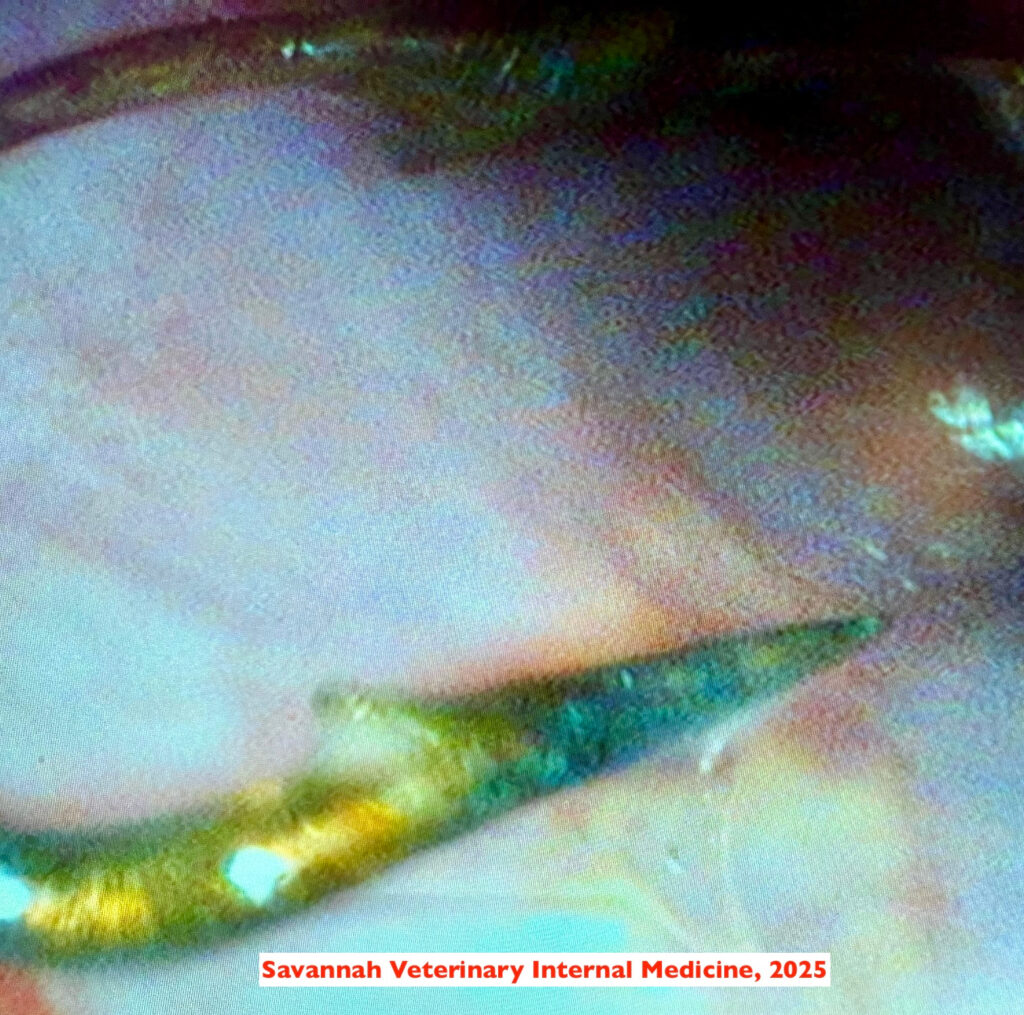
What To Do: Offer plenty of fresh water frequently at the beach, and keep your dogs in sight and supervised to help avoid beach-related injuries.
6. Coyotes: A Growing Urban Threat
Coyotes are common in urban and suburban areas of Georgia and can lose their natural fear of humans, leading to bolder and more aggressive behaviors. They are known to attack and kill pets.
Tybee Island: During 2022-2023, coyote sightings became a significant concern for residents of Tybee Island, particularly on the island’s north end. Coyotes were seen in neighborhoods and were known to be a threat to domestic pets and local wildlife, including sea turtle nests. The city took action in late 2023 to help control the growing threat.
Renewed Threats: In 2025 coyote sightings on Tybee Island have once again been on the rise. Residents have reported seeing coyotes on North Beach, and in residential areas.
What to do:
Eliminate Attractants: Secure trash and remove unattended pet food.
Hazing: Use deterrents like yelling or noisemakers to scare coyotes and reinforce their fear of humans.
Close Supervision: Keep pets inside or leashed outdoors, and be especially alert during dawn and dusk walks.
7. Rabies: A Fatal But Preventable Threat
Rabies is a viral disease that affects the nervous system and is almost always fatal once symptoms appear. It is regularly reported in Georgia, and while human cases are rare, positive animal cases are not. Rabies is primarily a wildlife disease, with raccoons, skunks, bats, and foxes serving as the main carriers.
Chatham County: 2023 was a particularly active year for rabies in Chatham County, with multiple confirmed cases.
Raccoon Cases: In March 2023, an aggressive raccoon that bit a person near Montgomery Cross Rd. and the Harry Truman Pkwy tested positive for rabies. In September 2023, another raccoon in Midtown Savannah was found to be positive for the virus.
Bat Cases: A bat in the Forsyth Park area of Savannah tested positive for rabies in May 2023 after it was caught by a domestic cat. Another bat in Savannah was found in a home under a bed and tested positive, leading to recommendations for post-exposure treatment for the residents of the home. This event underscores the importance of rabies vaccination even for pets that rarely venture outdoors.
What to do:
Vaccination is Law: Under Georgia law, all owned dogs, cats, and ferrets must be vaccinated against rabies by a licensed veterinarian. This is the single most effective way to prevent the disease.
Avoid Wildlife Encounters: Do not feed, handle, or approach wild animals.
If your pet is exposed: If your pet is bitten or scratched by a wild animal, or has contact with a bat, seek immediate veterinary attention.
8. The Climate-Driven Dangers: Heat and Hurricanes
Coastal Georgia’s weather patterns present two major threats that require a proactive approach to pet safety: intense heat and seasonal storms.
Heat-Related Illnesses: A Silent Danger
Unlike humans, pets don’t sweat effectively and primarily cool down by panting. This makes them highly vulnerable to heatstroke in Georgia’s hot and humid climate.
What To Do:
Avoid Peak Heat: Limit strenuous activities between 10 a.m. and 4 p.m.
Never Leave Pets in Cars: Internal temperatures can rise to deadly levels in minutes, even on mild days.
Provide Shade and Water: Always ensure access to a cool, shaded place and plenty of fresh water.
Hurricanes: The Ultimate Preparedness Test
The Georgia coast is susceptible to tropical storms and hurricanes. The key to keeping your pets safe during a storm is to prepare well in advance.
What To Do:
Create a Pet Hurricane Kit: Have at least a week’s supply of food and water, a sturdy carrier, medical records, and medications.
Have an Evacuation Plan: If it’s not safe for you to stay, it’s not safe for them. Identify pet-friendly shelters and hotels outside of the evacuation zone well before a storm hits.
During and After the Storm: Keep pets secured indoors during the storm. Afterwards, keep them leashed as your surroundings will have changed dramatically, with potential hazards like downed power lines, contaminated floodwaters, and sharp debris.
9. Bites & Stings: Pests Threatening Pets
Coastal Georgia’s warm, humid climate creates an ideal breeding ground for mosquitoes, ticks, and other creepy-crawly pests, making year-round prevention and surveillance critical.
Insects & Parasites: The Tiny Threat
Heartworm: Transmitted by mosquitoes, heartworm disease is highly prevalent in Georgia. Year-round preventative medication is a non-negotiable aspect of responsible pet care.
Ticks: Ticks transmit a range of serious diseases like Lyme disease. Routine flea and tick preventatives are essential, as are daily checks after outdoor activity.
Fleas: Infestations are easily established in your home or yard without prevention. Fleas can result in tapeworms (“butt scooting”), Cat Scratch Disease and, in smaller pets, severe anemia from exsanguination.
What To Do: There are many safe and effective flea and tick preventatives available. Year-round protection from these pests is recommended in Savannah and Coastal Georgia. Talk to your vet about the most appropriate ones for your pet. Your pets rely on you to make smart, informed decisions, don’t let them down.
Spiders: Eight-Legged Dangers
Black Widow Spiders: These are the most dangerous spiders in the region. The female is easily identified by her glossy black body and the distinct red or orange hourglass-shaped marking on the underside of her abdomen. Their venom affects the nervous system and can cause severe muscle cramps, tremors, paralysis, and difficulty breathing.
Brown Recluse Spiders: These spiders are often misidentified, but they are a definite threat. They are light brown with a dark, violin-shaped marking on their back. Their venom destroys tissue around the bite site, often leading to a non-healing ulcer that can take months to heal.
What To Do: A bite from either a black widow or a brown recluse requires immediate veterinary attention. The best prevention is to avoid cluttered, undisturbed areas where these spiders like to hide, such as woodpiles, sheds, and garages.
10. Leptospirosis: A Hidden Bacterial Threat
Leptospirosis is a serious bacterial disease found worldwide, and we diagnose this frequently at Savannah Veterinary Internal Medicine. It is spread through the urine of infected wildlife, such as raccoons, opossums, and rodents, and contaminates water for weeks to months after wildlife urinate in these areas. Pets contract it by drinking from or wading through contaminated water sources like puddles, streams, man-made ponds and the marshes within gated communities along the Georgia coast.
Symptoms: Early signs of leptospirosis can be vague, including fever, lethargy, and loss of appetite. However, the disease can quickly progress to severe kidney or liver failure, which may lead to death.
What To Do: The best defense is to prevent your pet from drinking from or swimming in stagnant outdoor water. More importantly, there is a vaccine available for dogs and is highly recommended for dogs in the Savannah and Lowcountry region.
We Get Savannah and Coastal Georgia
Understanding the environmental and household dangers in Savannah and Coastal Georgia is the first step toward keeping your pets safe. But despite your best efforts, emergencies can still arise. If they do, know that we’re ready to provide the advanced diagnostics, treatment, and guidance needed to manage even the most complex conditions. If you have any concerns or need assistance, please contact our team. We’re here for you and your pet.

Author:
James Woods DVM, MS, DACVIM (SAIM)
Ph: (912) 721-6410
Contact Us
